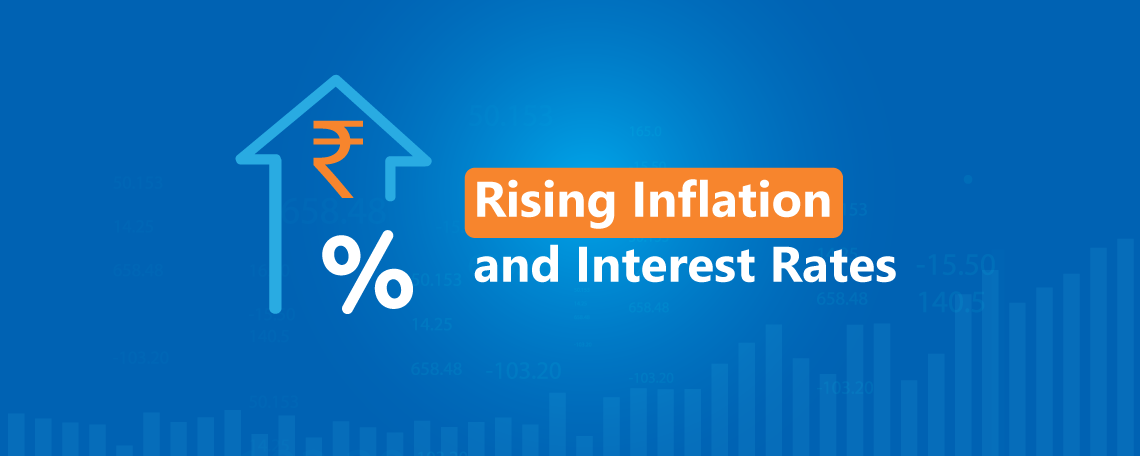What To Do When The
Market Goes Down
June 24, 2022

The stock markets globally have been choppy since the beginning of 2022 due to various uncertainties surrounding us. We have already spoken about the factors that have been influencing the market in much detail in our previous blog on Rising Inflation AndInterest Rates. While the investors are left confused about whether or not it is the right time to invest, we at StockAxis are confident that it is indeed possible to beat the market even in times like these. Today, we are all set to explore how you as an investor can actually invest when the market goes down.
To begin with, let us acknowledge that uncertainty is always present in the market. One cannot avoid the fact that no one can ever have complete certainty of future outcomes. So, it is in our best interest to focus on what investment strategy we adopt in order to shield our portfolios from unpredictable risks and also to capture the various opportunities that are present in the market. It is also normal that during times of increased uncertainty, the volatility increases as well. This is because investors as a whole are trying to interpret new information and then revaluing assets based on this new information. Typically, the bigger the range and severity of potential outcomes, for instance, the pandemic, wars, interest rate hikes, growth predictions etc., the bigger the price fluctuations.
Amidst the current turmoil, Equity Advisors and Research Analysts at StockAxis often encounter questions such as - Should I sell my stocks? Should I buy more? Should I do nothing? While these are very valid questions & we are always happy to help, we are about to share with you a few questions that can add more conviction to your decision-making as far as investment is concerned and can help you make more rational choices.
What is my thesis for the stock in question?
When you buy a stock, the right thing to do is understand not only where you are putting your money, but also why you are doing it. If we have made the decision to part with our cash and invest in a stock, then we should have a narrative around that stock that justifies our decision. If we don’t have one, then we are just speculating.
So, during times of market volatility, the first thing that you need to do is to go through each stock on your portfolio and review your narrative or thesis for each stock. Try to understand your expectations for the underlying business’s future prospects that drove your purchase decision in the first place and evaluate if it is still true today. Ask yourself a simple question: If I didn’t already own this stock, then would I still buy this stock today?
For instance, you may have invested in Infosys Ltd. for its consulting, technology, outsourcing and next-generation digital services to clients on a global scale. Now all you have to do is reconfirm that your thesis still holds true and that the business is up to date.
Has my thesis been impacted by any recent developments?
Once you have done that, it is time to see if your thesis needs any updating. This is where you take any new information that wasn’t available previously and incorporate it into your assumptions and estimates of the future for each of the stocks that you are holding. This could be anything from industry-specific policies to changes in the management of the company. StockAxis research tools can help you analyse the fundamentals of stocks and also help you track the latest news and ratings along with any changes in the trends.
With our Infosys example above, let’s say that you found a few macroeconomics developments that impact the business. There are structural changes in the IT industry as there is high demand for services like i) digital transformation, ii) cyber security, and iii) cloud. Several sectors are also seeking technology-based solutions notably in healthcare, life sciences, banking, telecommunications and essential retail in the post covid world. Additionally, work from home and reduction in discretionary spendings like branding, marketing, re-negotiation of rents and no travel costs are also improving margins for Infosys. But the global economic recession and foreign currency exposure may be areas of risk & concerns.
You need to try and incorporate this new information into your thesis and see if it changes your narrative around the stock.
If so, how does this impact my thesis?
You may be required to revise your estimates and check if the growth prospects are consistent with your own thesis. Leveraging technologies to transform and future-proof businesses is increasingly becoming a top strategic imperative for business leaders. The Indian IT services market is expected to grow at 10% CAGR over 2019-2025 and generate revenues of $ 350 billion, while Global IT services spend is expected to grow at 4.8% CAGR over 2019-2022.
This confirms that Infosys is a key beneficiary of increasing IT spending globally. The business is seeing significant traction in cyber security, workplace transformation, digital, and cloud while the deal pipeline is robust with healthy large deal wins.
Ultimately, any significant change in the future estimates of your thesis is likely to change your estimated valuation of a stock.
Based on my latest evaluation, is it still a quality stock to hold?
This question is necessary to prevent you from making emotional decisions based purely on price movements. We want to focus on the underlying business first and then see if the market is offering you an opportunity.
We now know that Infosys delivered a strong quarter and has continued to outperform TCS on the growth front for the 5th consecutive quarter and the margin difference has also narrowed.
So, before you jump to make an irrational decision regarding your stocks based on emotions and speculations alone, consider following the steps laid out above. Consider what has actually changed (if anything) in the underlying businesses of the stocks you own and whether the broad negative market sentiment has provided you with an opportunity to capitalize on it.
So, to implement the process above, you can curate your own watchlist here at StockAxis and go through each stock with the process outlined above. We are confident that you will become a more level-headed and rational investor in the process and be able to avoid the fear and greed of crowds. Of course, this doesn’t take into account your personal financial situation. This is only referring to the management of your portfolio assuming that you’re willing to remain invested over the long term and do not need to withdraw cash to meet expenses in the short term.
In case you are wondering how you can pick the right stocks for your portfolio that can help your overall financial growth, then we may have just the right investment solutions for you. Investing in quality research before investing in the stock market can actually help you save money in the long run. Here are the top 4 reasons why you need a professional to manage your equity portfolio&guess what? These reasons make perfect sense!












